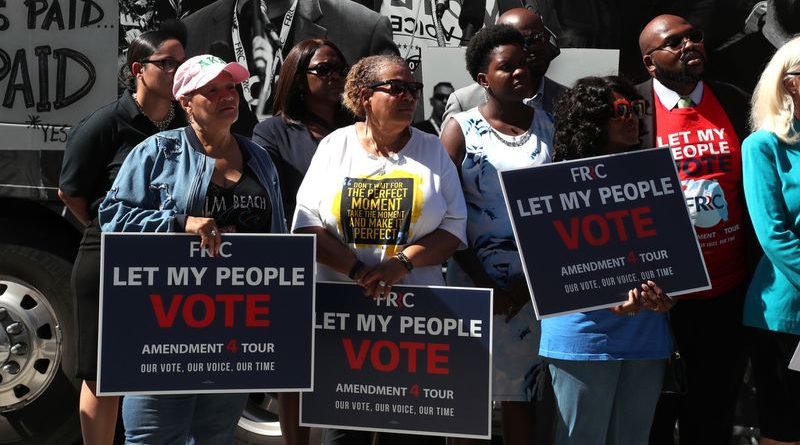Amendment 4: A Never-Ending Legal Battle for the Right to Vote
As we inch closer to the Florida Primary, there are over 700,000 Floridians who cannot vote on August 18th or on November 3rd. In 2018, Florida voters had the chance to cast their vote for or against Amendment 4, which would let non-violent felons be able to register to vote. The proposed ballot amendment needed to pass with at least 60% of the vote. The ballot measure was written to be self-executing and if it was passed it would go into effect on January 8th, 2019. On November 6, 2018 Amendment 4 passed with 65% of Florida voters voting in favor to allow felons the right to vote and overturned a 150-year law that restricted felons’ voting rights.
Championed by the Florida Rights Restoration Coalition, Amendment 4 was a bipartisan effort to end Florida’s outlier status as the state with the most people permanently banned from voting.
Two years later and Amendment 4 has still not gone into effect.
In an effort to stonewall the amendment from going into effect, the Republican-led legislature passed SB7066 and it was signed into law by Governor Ron DeSantis in 2019 which required individuals to pay back fines, fees and restitution as part of their sentence. The new law was labeled by critics as a “poll tax” and voter rights advocates sued Governor DeSantis and the state of Florida.
This past May, District Court Judge Robert Hinkle ruled the law unconstitutional and ordered the state must allow most felons in Florida to vote, regardless of outstanding debts. Governor DeSantis appealed Hinkle’s ruling to the 11th U.S. Circuit Court of Appeals. Hinkle’s ruling was put on hold as the 11th Circuit Court considered the appeal which will be heard on August 18th, the same day as the Florida Primary. Voting rights groups asked the Supreme Court to weigh in.
On July 16, the Supreme Court declined to overturn the federal appeals court’s decision, which blocked some felons from being eligible to vote in elections. The Supremes let stand the temporary hold of Hinkle’s ruling by the U.S. Court of Appeals for the 11th Circuit.
It is not customary in emergency requests for the majority opinion to offer a reason for its decision. However, Rick Hasen, an election law professor at the University of California Irvine, pointed out on his blog, “This ruling is a big deal and shows a conservative Supreme Court majority consistently siding against voting rights.”
Amendment 4 is not only about the rights of convicted felons, it is also about voter confidence and allowing a person’s vote to count. The overreaching and unconstitutional actions by DeSantis and the Republican-led legislature to hinder Amendment 4 from going into effect as it was written and voted on by Florida voters is unconscionable. Whether or not the Governor views it this way, he is actively taking part in suppressing the vote of nearly 775,000 people while concurrently telling the Floridians who voted yes on Amendment 4 their vote doesn’t matter.
It remains to be seen if Amendment 4 will ever go into effect, as intended by the 65% of Floridians who voted in favor of it or if those with felony convictions and outstanding debts will ever get their rights restored. The one thing we have learned is Governor Ron DeSantis does not trust Florida voters. The bright side is those who are eligible to vote can send a referendum back to Tallahassee on August 18th and again on November 3rd. Amendment 4 may not have found its way into the law the way voters intended in 2018, but those who can vote have a duty to vote for those who can’t right now.

